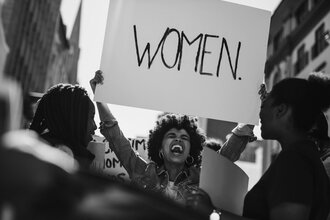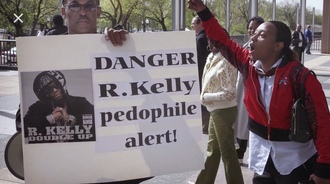- Featured
- Afropunk Army
- Community Control
- Confederate Symbols
- Cop Watch
- Corporate Accountability
- Criminal Justice Policy
- Drop/Bring Charges
- Economic Justice
- Education
- Employment Discrimination
- End The War on Black People
- Environmental Justice
- For-Profit Colleges/Universities
- Gulf Coast
- Housing Rights
- Immigration
- Invest-Divest
- Media Accountability
- Music Industry
- No Guns in Schools
- Open Internet
- Police Accountability
- Political Power
- Pop Culture
- Private Prisons
- Reparations
- Reproductive Justice
- Right Wing Racism
- School-to-Prison Pipeline
- Sports
- Voting Rights
- Wrongful Imprisonment
- More
-
Free African American/Black Women & Girls from Systemic Racism, Insidious Harm, and TraumaAfrican American/Black women and girls have historically endured all manner of physical and psychological violence. The emotional, mental, psychological violence as well as physical violence aimed at African American/Black women and girls is traumatic and denies African American/Black women and girls their humanity. Discrimination in education, discrimination in the workplace, healthcare, and beyond has essentially created an American society that is hostile for African American/Black women and girls. The right to live free of harm and the failure of a systemic approach to create equitable policies with equitable outcomes for African American/Black women and girls is unacceptable. Systemic harm of any woman and girl compromises the safety of all women and girls. Stand for the freedom, liberation, and protection of African American/Black women and girls. https://www.msn.com/en-us/news/us/black-americans-are-getting-support-for-reparations-from-other-multiracial-groups/ar-AA1cHmnm?ocid=msedgntp&cvid=223ff2abf7f9433ca3c9718dd2d57cfd&ei=13.349 of 400 SignaturesCreated by Carla Lee
-
SHINING LIGHT ON THE INJUSTICES DONE TO LEONARD GRAVESANDEBy the constitution we as Americans have certain rights and when they're violated we have to come together and right the injustices.226 of 300 SignaturesCreated by Leonard Gravesande
-
A Call for A Cultural New Deal for Cultural and Racial JusticeThe Cultural New Deal for Cultural and Racial Justice is a call for us to transform our personal, institutional, and global thinking. We believe that culture moves before policy. We believe that culture endures beyond politics. We wrote this Call because our work in culture and arts is inextricably linked to larger social movements for change. We invite you to adopt and adapt this Call to your specific contexts to hold leaders, policy-makers, and institutions — and ourselves — responsible, accountable, and transparent in achieving equity and justice. In these unprecedented times, as justice movements converge, many of us have asked ourselves what the stakes are for the culture we want to advance. We concluded that we needed to change the conditions under which we artists and culture bearers labor and live. The Cultural New Deal for Cultural and Racial Justice points us toward new understandings of how we together can build a culture that is inclusive, sustainable, and leads us toward justice and freedom for all. We urge timetables that are immediate and demonstrate change that is not aspirational, but concrete, measurable and visible within 1-3 budget cycles. We offer this Call in the spirit of advancing accountability and collective responsibility, and urge you to activate these ideas within your work and our shared future. // El Nuevo Trato Cultural para la Justicia Cultural y Racial es una convocatoria para que transformemos nuestro modo de pensar personal, institucional y global. Creemos que la cultura cambia antes que la política. Creemos que la cultura perdura más allá de la política. Escribimos este llamado porque nuestro trabajo dentro de la cultura y las artes está inextricablemente entrelazado con los movimientos sociales para el cambio. Les invitamos a adoptar y adaptar este Llamado para sus contextos particulares para responsabilizar a líderes, creadores de políticas e instituciones, al igual que nosotres mismes, por lograr la equidad y la justicia de forma responsable y transparente. En estos tiempos sin precedentes, conforme convergen los movimientos por la justicia, muches de nosotres nos hemos preguntado qué está en juego para la cultura que queremos avanzar. Hemos concluido que tenemos que cambiar las condiciones bajo las cuales nosotres les artistas y portadores de cultura trabajamos y vivimos. El Nuevo Trato Cultural para la Justicia Cultural y Racial nos dirige hacia nuevos entendimientos sobre cómo, juntos, podemos crear una cultura que es inclusiva, sustentable y que nos lleva hacía la justicia y la liberación para todes. Exigimos cronogramas que son inmediatos y que demuestran un cambio que no es aspiracional y que, más bien, es concreto, medible y visible dentro de 1 a 3 ciclos presupuestarios. Ofrecemos este Llamado en aras de avanzar la transparencia y la responsabilidad colectiva y urgimos que activen estas ideas dentro de su trabajo y dentro de nuestro futuro compartido.2,463 of 3,000 SignaturesCreated by Cultural New Deal for Cultural and Racial Justice

-
#DontMuteDCSmall business owner, Donald Campbell, has been playing go-go music - a musical form that owes its development to D.C.’s native, Black, cultural traditions - from his Metro PCS storefront in Shaw for nearly 24 years. However, after residents of a new, neighboring, high-rise condominium made complaints last month, T-Mobile ordered Donald to stop playing the music that has so defined the city’s rich history. Anyone who is familiar with Shaw is familiar with Donald’s music, which he plays during business hours and which, by his storefront commissioner’s own admission, does not violate local sound regulations. Yet, despite the fact that generations of residents and students have grown up gathering on his block to listen and to commune, T-Mobile has insisted that he “get rid of the music” or lose his livelihood. Black cultural norms and traditions are under attack in large, metropolitan cities like Washington D.C., where rates of gentrification and displacement are skyrocketing. As the cost of rent shoots up in neighborhoods like Donald’s, many residents and local store owners are being forced out of the only place they have ever known and criminalized for participating in the very cultural practices that they have inherited. And as more and more people move away, lose their businesses, and even, in many cases, their places of shelter, actions like T-mobile’s underscore a larger message to long-time Black residents of the neighborhood: you are no longer welcome in your own home. This is unacceptable. Members of the local Advisory Neighborhood Committee say that in the long history of his business’s operation, Donald’s music has never been a problem. But a few complaints from wealthier residents who are new to Shaw and to its traditions have been enough for T-Mobile to threaten the cultural integrity of a community that Donald’s music has always brought together. We demand that T-Mobile put an end to their criminalization of Black culture and art in Washington D.C. We demand that T-Mobile allow Donald to bring his music back!4,141 of 5,000 SignaturesCreated by Jamal Jones
-
#MuteRKelly on local Kansas City, MO radioBy continuing to listen to and purchase R. Kelly music, we not only fund his predatory crimes and behavior but we are saying that we condone his behavior. Further, it sends a message that our black girls don’t matter! #MuteRKelly #blackgirlsdomatter467 of 500 SignaturesCreated by Nancy George
-
Shut Down NYC R. Kelly Concert at FREQ on January 27, 2018Facts on Violence Against Black Women Girls African American girls and women 12 years old and older experienced higher rates of rape and sexual assault than white, Asian, and Latina girls and women from 2005-2010. U.S. DOJ Bureau of Justice Statistics, “Female Victims of Sexual Violence, 1994-2010,” 2013 40-60% of black women report being subjected to coercive sexual contact by age 18. Black Women’s Blueprint, “The Truth Commission on Black Women and Sexual Violence,” 2012 4 in 10 black women have been subjected to intimate partner violence in their lifetimes. National Center for Injury Prevention and Control and the Centers for Disease Control and Prevention, “The National Intimate Partner and Sexual Violence Survey: 2010 Summary Report,” 2011. Black girls are disproportionately at-risk for sexual trafficking. Over 40% of confirmed sex trafficking survivors in the U.S are African-American. Banks, Duren and Kyckelhahn, Tracey, “ Characteristics of Suspected Human Trafficking Incidents, 2008-2010”, The Bureau of Justice Statistics, 2011. Black women also experience significantly higher rates of psychological abuse—including humiliation, insults, name-calling, and coercive control—than do women overall. Institute for Women’s Policy Research “Stereotypes regarding African American women’s sexuality, including terms like ‘Black jezebel,’ ‘promiscuous,’ and ‘exotic,’ perpetuate the notion that African American women are willing participants in their own victimization. However, these myths only serve to demean, obstruct appropriate legal remedies, and minimize the seriousness of sexual violence perpetrated against African American women.” Women of Color Network, “Communities of Color: African American Women” 2014. A study found that college students perceived a black victim of sexual assault to be less believable and more responsible for her assault than a white victim. Donovan, “To Blame or Not to Blame: Influences of Target Race and Observer Sex on Rape Blame Attribution,” 2007. Some African American women’s decisions not to report their sexual assaults may be influenced by the criminal justice system’s history of treating European-American perpetrators and victims differently than perpetrators and victims of color. Women’s Institute for Leadership Development for Human Rights, “The Treatment of Women of Color Under U.S. Law: Violence,” 2001. For every African-American woman who reports her rape, at least fifteen African-American women do not report theirs.1,573 of 2,000 SignaturesCreated by Black Women's Blueprint

-
Change the National Anthem to Bodak YellowThe National Anthem was written during a time when white Americans could have slaves and no women were unable to vote. I want a national anthem that empowers women and talks about economic prosperity for all. And that anthem is Bodak Yellow.37 of 100 SignaturesCreated by Wintana Melekin
-
End Business Ties To R.KellyR.Kelly continues to profit off his music career with new business opportunities, despite the numerous allegations against him of sexual abuse against women. The investigation has shown that R. Kelly has been continuing his behavior as a sexual predator who targets teenagers for manipulation. This is the latest in a long documented history of incidents showing R. Kelly to be a sexual predator. R. Kelly's documented history as a sexual predator is long. He married Aaliyah when she was a teenager, he's been known to target young women at his former high school, and now Buzzfeed has exposed his continued manipulation, mental and emotional abuse of teenagers today. Despite this established, and documented history R. Kelly has recently been featured on award shows and releasing albums. Record companies still pay R.Kelly to make music, and venues are still booking this man to come onto their stage and recruit new victims. Enough, we can not allow corporations to sacrifice the well being of Black girls and women simply for profits. All companies must end their ties to R.Kelly and stop enabling this sexual predator.842 of 1,000 SignaturesCreated by K .






.png)

